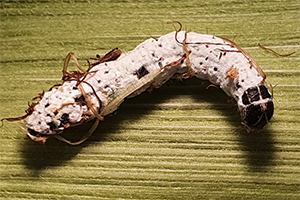The PBRI has scheduled a series of workshops across the year to explore current and proposed research around agreed high priority topics.
The purpose of these workshops is to collaborate across sectors, building on existing research investments underway, or to examine new areas of research that may provide benefit to multiple plant industries, and be the focus of future co-investment.
The workshop programs will be developed around research solutions, that address clearly defined and high priority plant biosecurity problems.
The second PBRI workshop for 2021 honed-in on novel approaches to sustainable pest and weed management across industry sectors.
On 30 March, a high-calibre group of Australian researchers presented their latest research on sustainable pest management.
The topic was introduced by Dr Ken Young, Senior Manager Biosecurity and Regulation at GRDC, who acknowledged the importance of having a diverse suite of tools for sustainable pest management as part of successful IPM programs. This includes chemical, plant resistance, cultural and biological approaches. Ken emphasised how critical extension and adoption is, outlining a 12-step extension framework to achieve successful management practices, including incentives and motivational factors.
The workshop program included Professor Ary Hoffman (University of Melbourne) who presented new research from the Australian Grains Pest Innovation Program, on novel pest suppression and resistance management of invertebrate grain pests, manipulating endosymbionts in key aphid pest species.
Professor Ron Hill (University of Sydney) described a targeted approach using hormone receptors for insect control. The research includes a novel screening method for molecules binding to ecdysone receptors which will lead to the development of products that can discriminate between beneficial and pest insect species.
Professor Phil Taylor (Macquarie University) gave an overview of several areas of research: on effective attractants for surveillance, monitoring and ‘lure & kill’, automated screening for biosecurity threats in containers at ports of entry, pesticide-resistant beneficial species for integrated chemical and biological pest control, and effective and safe repellents.
Dr Ian Newton (DAF) described research on entomopathogenic insecticide, detailing the benefits of using species-specific nuclear polyhedrosis viruses (NPVs) and fungal species as biopesticides that will not harm beneficial insects and pollinators. A number of NPVs have been found in Australian populations of fall armyworm, which will be further investigated.
Dr Raelene Kwong (Agribio) presented a new five-year project on host specificity testing of the blackberry sawfly for the control of blackberry. The previous biocontrol candidate, blackberry rust, was not effective against all species and genotypes of blackberries and not effective in drier climates or forested areas. This has led to new research supported by Meat and Livestock Australia, on an insect biocontrol candidate, the cane-boring sawfly.
Professor Geoff Gurr (Charles Sturt University) described his research on landscape management to support beneficial arthropods. He highlighted that large cropping monocultures with well-controlled weeds, insecticide use, and long distances to non-crop vegetation are not conducive to a healthy diversity of beneficial insect species. He demonstrated that adding nectar plant borders to rice crops in China increased the beneficial insect population, reduced pests and the need for pesticides, and increased yield and profit. This approach can be adapted to a wide range of crops and is currently being trialled on brassicas and grapevines in work supported by Hort Innovation and Wine Australia.
Professor Neena Mitter (QAAFI, University of Queensland) presented her work on Bioclay, an RNA-based biopesticide, supported by Hort Innovation, Cotton Reserch and Development Corporation and the Australian Research Council. Neena described research on the successful control of tomato spotted wilt virus, zucchini yellow mosaic virus and silverleaf whitefly. Promising results have been observed with botrytis, fusarium and phytophthora and new research has demonstrated control of myrtle rust.
Dr Sharon Downes and Dr Peter Hunt (CSIRO) wrapped up the workshop by presenting the ‘Agripest Challenge’ describing a chemical-limited future based on growing market demands for limited chemical use, resistance to pesticides increasing, and the ongoing cost of chemicals to growers.
In a systems-approach to sustainable pest management, the Agripest Challenge points to an opportunity to better integrate research and development and adoption for pests, weeds and disease with supply chain and market demands, across industry sectors.
Following on from this workshop, the PBRI Steering Committee will meet on 20 April to discuss co-investment opportunities that address sustainable pest management for multiple plant industry sectors.
